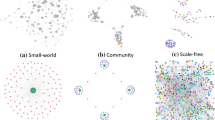Abstract
Future communication networks will be composed of a diversity of highly heterogeneous network variants, ranging from energy constrained wireless sensor networks to large-scale wide area networks. The fact that the size and complexity of such networks will experience tremendous growth will eventually render existing traditional network management paradigms unfeasible. We propose the radically new paradigm of in-network management, which targets the embedding of self-management capabilities deep inside the network nodes. In this paper, we focus on our framework for in-network management, which allows management logic to be embedded and executed within network nodes. Based on a specific use-case of bio-inspired network management, we demonstrate how our framework can be exploited in a network failure scenario using quorum sensing and chemotaxis.
Preview
Unable to display preview. Download preview PDF.
Similar content being viewed by others
References
Turing, A.M.: The Chemical basis of morphogenesis. Philosophical Transaction of the Royal Society 237, 37–72 (1952)
Autonomic Network Architecture (ANA). Project funded by the European Union Information Society Technologies Framework Programme 6 (EU IST FP6), http://www.ana-project.org/
Jennings, B., van der Meer, S., Balasubramaniam, S., Botvich, D., Foghlú, M.Ó., Donnelly, W.: Towards Autonomic Management of Communications Networks. IEEE Communications Magazine 45(10), 112–121 (2007)
Jelger, C., Tschudin, C., Schmid, S., Leduc, G.: Basic Abstractions for an Autonomic Network Architecture. In: Proceedings of the 1st IEEE WoWMoM Workshop on Autonomic and Opportunistic Communications (AOC 2007), Helsinki, Finland (June 2007)
Sestinim, F.: Situated and Autonomic Communication – an EC FET European Initiative. ACM SIGCOMM Communication Review 36(2), 17–20 (2006)
Martin-Flatin, J.-P., Znaty, S., Hubaux, J.-P.: A Survey of Distributed Enterprise Network and Systems Management Paradigms. Journal of Network and Systems Management 7(1), 9–26 (1999)
Ruiz, L.B., Nogueira, J.M., Loureiro, A.A.F.: MANNA: A Management Architecture for Wireless Sensor Networks. IEEE Communications Magazine 41(2), 116–125 (2003)
Miller, M.B., Bassler, B.L.: Quorum sensing in Bacteria. Annual Review in MicroBiology, 165–199 (2001)
Agoulmine, N., Balasubramaniam, S., Botvich, D., Strassner, J., Lehtihet, E., Donnelly, W.: Challenges for Autonomic Network Management. In: 1st Conf. on Modelling Autonomic Communication Environment (MACE), Dublin, Ireland (2006)
Balasubramaniam, S., Botvich, D., Gu, T., Donnelly, W.: Chemotaxis and Quorum Sensing inspired Interaction supporting Social Networking. In: Proceedings of 65th IEEE Vehicular Technology Conference (IEEE VTC Spring), Dublin, Ireland (April 2007)
Balasubramaniam, S., Botvich, D., Donnelly, W., Foghlú, M.Ó., Strassner, J.: Bio-inspired Framework for Autonomic Communication Systems. In: Dressler, F., Carreras, I. (eds.) Advances in Biologically Inspired Information Systems: Models, Methods, and Tools. Studies in Computational Intelligence. Springer, Heidelberg (2007)
van der Meer, S., Donnelly, W., Strassner, J., Jennings, B., Foghlú, M.O.: Emerging Principles of Autonomic Network Management. In: 1st IEEE Int’l Workshop on Modelling Autonomic Communications Environments, Dublin, Ireland (October 2006)
Cheng, Y., Farha, R., Kom, M.S., Garcia, A.-L., Hong, J.W.-K.: A Generic Architecture for Autonomic Service and Network Management. Computer Communications 29(18), 3691–3709 (2006)
Author information
Authors and Affiliations
Editor information
Editors and Affiliations
Rights and permissions
Copyright information
© 2008 Springer-Verlag Berlin Heidelberg
About this paper
Cite this paper
Foley, C. et al. (2008). A Framework for In-Network Management in Heterogeneous Future Communication Networks. In: van der Meer, S., Burgess, M., Denazis, S. (eds) Modelling Autonomic Communications Environments. MACE 2008. Lecture Notes in Computer Science, vol 5276. Springer, Berlin, Heidelberg. https://doi.org/10.1007/978-3-540-87355-6_2
Download citation
DOI: https://doi.org/10.1007/978-3-540-87355-6_2
Publisher Name: Springer, Berlin, Heidelberg
Print ISBN: 978-3-540-87354-9
Online ISBN: 978-3-540-87355-6
eBook Packages: Computer ScienceComputer Science (R0)




